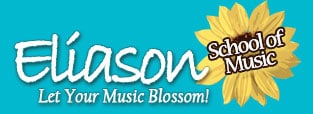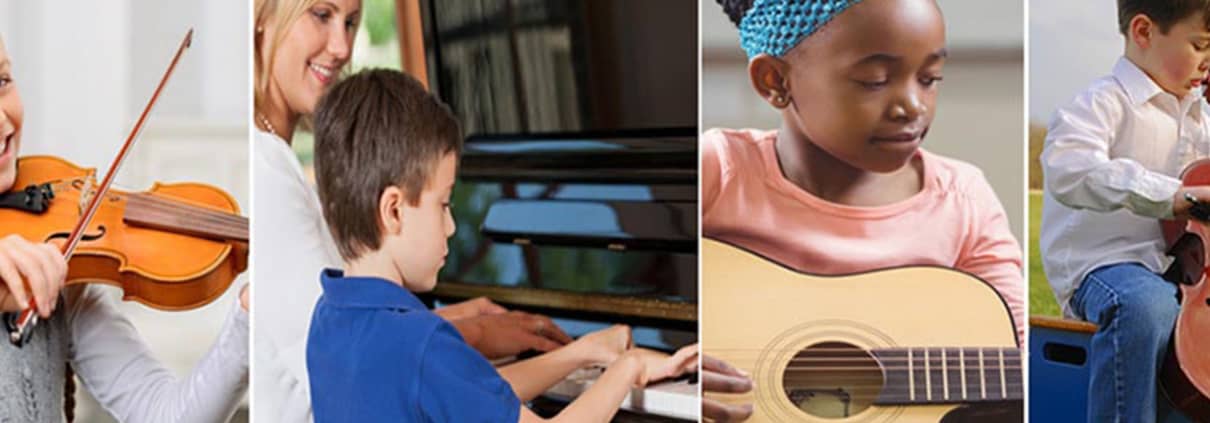The Parent’s Guide to Beginning Music Lessons: This guide is designed to help parents who are thinking about starting their children in music lessons. As a music teacher for twenty years, I have answered the most common questions I am typically asked about beginning children in music!

~ ~~~~~~Question: “My child is almost four years old. Is this too young to begin lessons?” Answer: This varies greatly depending on the child as well as the expectations for the lessons. A typical beginning music lesson is thirty minutes in length and therefore requires an attention span that can last for the duration of this time. Some children near the age of four will have no difficulty focusing for an entire lesson while others cannot yet hold their attention and they are not ready. If you feel that your child is very focused for their age, then perhaps a single beginning music lesson can be arranged to see if it is they are ready. It should also be mentioned that no matter how talented a child may be progress is typically slower at this age. The risks of beginning lessons too early are the learning of bad habits with the instrument as well as becoming frustrated and turned off to music. If, however, beginning music lessons are structured in a fun and exciting way and proper technique is being reinforced then the lessons are a success and it works wonderfully. Question: “What is the best instrument to begin learning music with?” Answer: Music educators will sometimes disagree with each other on the answer to this but typically the piano is the best choice followed by the violin. The way the piano is organized makes it easier for students to understand how music is structured and the learning curve is easier on the piano compared to many other instruments. Sometimes, however, children seem particularly drawn to the sound of a certain instrument and they should follow this inner guidance. For example, my parents first introduced me to the keyboard but I did not really enjoy it and had no interest in practicing. My parents probably figured I wasn’t destined to be a musician and I began focusing on other things. A year later I took a violin class at school and I loved the instrument which has become my passion ever since. If children are fascinated by a particular type of instrument and ask specifically for it then we should listen to this and choose the instrument they are longing to play. It should be mentioned that the piano and violin work well for students at the age of four but other instruments such as the flute or the guitar have physical demands that require waiting until about the age of six for beginning music lessons. Question: “What is the best method to use when learning an instrument?” Answer: This question can be answered by looking at the roadblocks that students can run into along their musical journey. The first example is when a student learns to decipher music purely by ear without any attention to note reading or music theory. If a student is kept in this method for too long they eventually reach a plateau where the music has become so complicated that they can no longer understand how to play these newer pieces. At this point students either quit due to the frustration or they begin a long and difficult path of heavy note reading and theory in an attempt to catch up to the demands of the music. Young children typically do not enjoy note reading assignments and if they are too long they become bored and frustrated. It is much easier to assign very short note reading assignments over a long period of time so this skill is developed easily and without struggle. The second example of a roadblock that students can run into is the complete opposite of the first. This is when the lessons begin with a heavy emphasis on note reading and theory while playing the instrument is extremely limited. I have heard stories of students who have attended beginning music lessons for two years, but they still have not learned a song. This is much like going to swimming lessons for years and talking all about swimming techniques without ever going into the water. It is important to dive in when learning an instrument and play songs early on so you can connect with and learn to love the instrument. If a program is designed in such a way that it allows students to both learn to play by ear and learn note reading and theory in small amounts along the way this approach will provide the best of both worlds. Children will be able to enjoy playing their instruments every day and they will begin to understand how music is structured through the note reading process. This combination approach keeps students motivated by playing lots of songs and it avoids the risk of not being able to understand the more complicated pieces they will learn in the future. Question: “How do I go about finding the right music teacher?” Answer: “Most parents want to see their children practicing consistently and if this is not happening then they are not happy. This is because parents want to see their children develop and grow. Parents also want to see their children happy and enjoying music all around. A skilled teacher will be able to understand this process and they will be able to deliver a healthy balance of fun and growth during beginning music lessons. I have noticed over the years that if students are not growing at all musically, they might be having fun, but it will not last. Other students who are growing all the time through very difficult pieces can become burnt out and lose the love of playing. Only when lessons balance fun and growth will the lessons be a success. This idea is a simple one but designing beginning music lessons in this fashion can be very challenging. Finding an experienced teacher with a music degree who is devoted to being a career teacher is preferable to a teacher who teaches as a hobby occasionally from their home. Music schools are the best place to find beginning music lessons and highly skilled teachers who are dedicated to their students and to music. Question: “How much practice should be required for learning the instrument?” Answer: “This varies depending on what your goals are in learning to play an instrument. Most parents are not pushing their children into music as a profession but they want to see them learn the skill and be able to play well. A quality, thirty minutes of practice four or five days a week can produce excellent results over time. Students who continue with this amount of practice will eventually be able to play extremely advanced works such as concerto’s and they have a beautiful sound when doing so. Music is a wonderful skill that children can have for life and will enrich their lives in so many ways. Question: “How long will it take for my child to become good at their instrument?” Answer: “This depends of course on how much time is devoted to practicing their beginning music lessons. Typically if a student is practicing thirty minutes a day, four to five days a week they should be able to play a Christmas Carol in about four to five months of practice and sound good while performing. To be able to perform more complex works such as Gavotte’s and Minuets will take about one and a half to two years and concerto performing will take about five years of study. Small, consistent practice over years can produce truly amazing results! ~ ~~~~~~Brian Eliason is a music educator who has taught over 15,000 music lessons and he is the founder of the Eliason School of Music in SW Portland. If you have questions, you can contact Brian through the website:www.EliasonMusic.com or by calling (503)293-2390.









